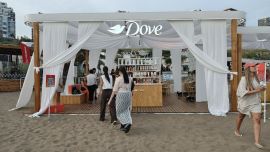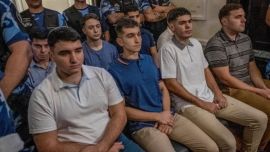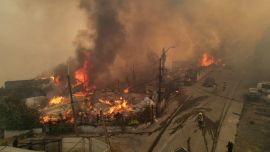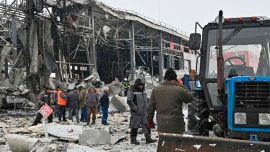THE WEEK IN CORONAVIRUS
At press time yesterday there was a total of 1,157,179 confirmed cases of coronavirus and 30,792 deaths, as compared to 1,069,368 cases and 28,338 deaths the previous Friday. Although daily deaths throughout the week continued to be numbered in the hundreds, for the first time since midyear Argentina started slipping back in the snakes and ladders of some international rankings, due to the second wave of coronavirus in Mediterranean Europe in particular – thus its seven-digit total of confirmed cases (one of only six in the world last week) retreated into 7th place on Tuesday, overtaken by Spain. The death toll crossed the 30,000 barrier on Wednesday. On Thursday the Senate voted 56-12 in favour of a law to maximise legal safeguards for laboratories working on a Covid-19 vaccine while Jujuy cleared the return of schoolchildren to classrooms.
NÉSTOR REMEMBERED, CRISTINA PENS A LETTER
President Alberto Fernández duly headed Tuesday’s ceremony to mark the 10th anniversary of 2003-7 president Néstor Kirchner’s death (and also the first anniversary of his election victory, relegated to second place) with by far the most conspicuous absentee the late ex-president’s widow, Vice-President Cristina Fernández de Kirchner. On the eve of the event the latter penned a letter anticipating her absence which shook up the political landscape by criticising unnamed government officials as well as the economic paralysis and prevailing uncertainty, also proposing an agreement between “all political, economic, media and social sectors” (with the government exclusively represented by the President) to end Argentina’s bi-monetarism which she sees as the root of all problems. At the tribute to Néstor Kirchner (centred around the repatriation of his statue from the Quito headquarters of the virtually defunct Unasur regional alliance, newly installed at the Kirchner Cultural Centre), President Fernández dodged his veep’s proposal by saying that dialogue with sectors was already up and running.
SQUATTERS SEIZE HEADLINES
There were contrasting evictions in the two main squatter hotspots of Guernica and Entre Ríos on Thursday, both heeding court orders. While 4,000 policemen descended on the former site with tear gas and rubber bullets to dislodge the squatters, some of who had been there for three months, accompanied by bulldozers to demolish their shacks, social activist Juan Grabois told his 40 followers in Santa Elena (Entre Ríos) to disperse peacefully from fields owned by the family of former Agriculture minister Luis Miguel Etchevehere as the Church disowned illegal land seizures. On Wednesday Buenos Aires Province Governor Axel Kicillof made a last-minute effort to vacate Guernica when he offered the squatters a monthly subsidy of up to 50,000 pesos if they would abandon the site – on the same day City Hall in the provincial capital of La Plata was assaulted by far left militants. Prior to the subsidy Kicillof came under fire for his comments earlier this month placing the “countries” (gated communities) on a par with squatters since “most” pay no taxes but during the week his own ARBA tax bureau clarified that only 230 of the 870 were in arrears, mostly for not upgrading their real estate from club or rural land status rather than outright evasion.
MARKETS, DOLLAR WATCH
All parallel exchange rates fell last week (the “blue” dollar to 173 pesos from 195 the previous Friday and the various exchange rates based on bond or share transactions from a 155.17-168.83-peso range to a 145-155.82-peso range yesterday), partly due to intensified controls at all levels and partly to Tuesday’s successes on peso bond markets, while the official exchange rate at Banco Nación edged up from 83.25 pesos (plus the 65 percent surcharges for potential savers). But longer-term investors were less convinced with country risk rising from 1,430 to 1,482 points in the course of the week, topping 1,500 points at times yesterday as Argentine bonds fell heavily on Wall Street. On Tuesday Argentina issued a varied menu of new bonds totalling 60 billion pesos, including dollar-linked (i.e. indexed to the official exchange rate), to take peso pressure off the money markets and fight off devaluation. On that day the massive money supply expansion helped Economy Minister Martín Guzmán to finance the Treasury by netting over a quarter trillion pesos via various instruments, over double the public-sector borrowing requirement. But on Wednesday Central Bank reserves fell below the US$40-billlon mark.
ATP SCHEME TRIMMED
Two social welfare measures for pandemic relief were tweaked last week. On Wednesday Deputy Cabinet Chief Cecilia Todesca announced that from this month the ATP wage supplement would only be extended to the hardest-hit sectors (tourism, culture and catering) while any other ATP money granted would be in the way of loans at subsidised interest rates. The next day President Alberto Fernández lifted the cap of five offspring for receiving the AUH family benefit on the grounds that it “stigmatised” large families, thus incorporating a further 723,000 children. The basic benefit amounts to 3,540 pesos per child with a further 2,966 for school assistance and an extra 1,535 pesos for handicapped children. In midyear 9.3 million children were estimated to be below the poverty line, according to official data.
SUPREME COURT – JURY STILL OUT
Last Saturday we ran an item reading: “Political pundits remained hanging all week on how the Supreme Court would rule on transferring three judges involved in the corruption trials of Vice-President Cristina Fernández de Kirchner back to their original benches but the five justices had yet to decide at press time yesterday evening.” We can repeat that word for word today, except that most pundits have found other targets for their attention.
CARRIÓ’S ‘GESTURE’
Elisa Carrió, founder of the Civic Coalition wing of the Juntos por el Cambio opposition coalition, urged her followers to support the government’s nomination of Daniel Rafecas for the post of Attorney-General as "an institutional gesture free from petty political speculation in these times when confidence is so lacking." The nomination of Rafecas entered the Senate on March 12 but has been delayed by the coronavirus pandemic and the lack of the requisite two-thirds majority in the Upper House. Rafecas has indicated his refusal to accept the post should government efforts to dodge that requisite with a simple majority prove successful, thus encouraging Carrió to back him lest he be replaced by a more Kirchnerite nominee. The post has stood vacant since the resignation of Alejandra Gils Carbó in 2016 with her second-in-command Eduardo Casal filling in since then.
BROTHERLY LOVE?
Ex-president Mauricio Macri has come under friendly (or rather fraternal) fire this month from his youngest brother Mariano. This week saw publication of the book Hermano by Santiago O’Donnell (who began his extensive journalistic career at the Buenos Aires Herald), in which Mariano Macri accuses his elder brother of destroying the family for his political and business ambitions. In mid-October Mariano Macri sued both his other brother Gianfranco and the three oldest of the ex-president’s children over the alleged under-pricing of the transfer of his 20 percent block of shares in the Socma family holding.
RETIRO SHOOTING
Homeless person Jonathan Maqueda, 31, was wounded four times outside the Villa 31 shantytown near Retiro station on Tuesday morning when he grabbed a revolver from a policeman and started a furious crossfire with other policemen. Two other police officers and a passer-by suffered minor wounds. The incident comes one month after a Federal Police inspector was stabbed to death by a schizophrenic outside MALBA museum.



















Comments